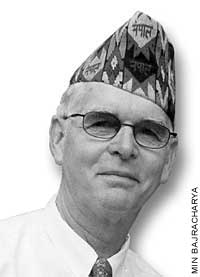 Nepali Times: How do you think Nepal has done in the education sector?
Nepali Times: How do you think Nepal has done in the education sector? Asbjorn Voreland: A lot has been achieved. There has been an attitude change-now more people send their girls to school, and education has given girls leadership qualities. Not many are in politics, but they make up for it in the social sectors. Nepali girls are bestowed with rare natural qualities to lead social change in society. Their contributions to Nepal's development are more than those of the men. Men are naturally ambitious-they would rather fight for top ranks and influential positions, rather than work towards creating space for others to grow.
When we first arrived here the caste discrimination was very intense. Bahun and other high caste boys would not sit with others, they would not clean toilets or treat their poorer classmates as equals. It was difficult to maintain discipline in the classroom, we had to threaten a lot of people with expulsion if they would not comply with classroom discipline. The Luitel School was established to teach the core values of fellowship, love, passion, and equality, and I feel it was successful in its mission.
How do you think we can ensure equal access to education for all?
The government should maintain similar standards in private and public schools, but it seems reluctant to improve the quality of public school education. Without this, only children from poor families will study in public schools, which could widen the disparities in society. Discipline should be maintained, and it should be equally applicable to all. Poor people invest a lot in their children's education. Not being able to provide them good education in public schools is a crime. The private sector has contributed a lot to education in this country, but that matters little if the poor have to sell their land and property to send their children to private schools.
Have you achieved what you had hoped to, when you first came here?
Now Nepal has democracy, which means equality, equity and equal access to development for everyone. I have witnessed children from very poor families from remote areas who have been high achievers when provided with opportunities for education. My students are leading this country in many areas, and I feel it is time that they now contribute towards creating similar opportunities to other poor communities that are being left behind. Democracy is also about giving, and providing opportunities to others.
But Nepal's education system has failed to teach this to students. It rarely teaches them life skills. It has failed to teach that democracy is also about sharing the burden-sharing the burdens of the country, of communities and of the family. Education should prepare students to make the best of what their country, and its state of development, have to offer. It feels sad that a student from the hills won't be able to find a job in the capital after completing the SLC, but he'd rather not return to his village. For Nepal, agriculture is the most important occupation, it needs more educated people. There are ample untapped opportunities for an educated hill boy in his own village, but the Nepali education system does not prepare him for this.
Were there any early warning signs that things would turn out this way in Nepal?
With the kind of disparity and lack of access to opportunities, this is bound to happen anywhere. There is rampant economic and social disparity and discrimination here. Some people have grown rich, but the majority is still very poor. Fewer opportunities are created for the poor and for people from remote areas. Social dissatisfaction is like a volcano-without an outlet, it is bound to explode. The poor have no freedom of choice, because opportunities are so limited. The ruling classes are too greedy to share the abundance of opportunities they enjoy. Peace will not come to this country unless it comes from inside of individuals.
When we first came here, there was severe caste discrimination and social disparity, a clear indication that the present situation might arise. When more and more young people were exposed to foreign countries in which democracy brought equality and equity and equal opportunities to all, they sought the same here in their own country. When that did not happen here even after democracy, their dissatisfaction had to find expression.
What has development given to Nepalis?
Nepal now has many new rich people. But they don't seem to realise that their responsibilities include helping destitute people achieve a comfortable living. Compassion is rare in developing countries, and the quality is deteriorating here too. Development has taught people to become individualistic, it has eroded spirit of community. This is the backlash of modern development. Nepal might become
a cruel, hard nation if it loses its traditional simplicity and
compassion.


